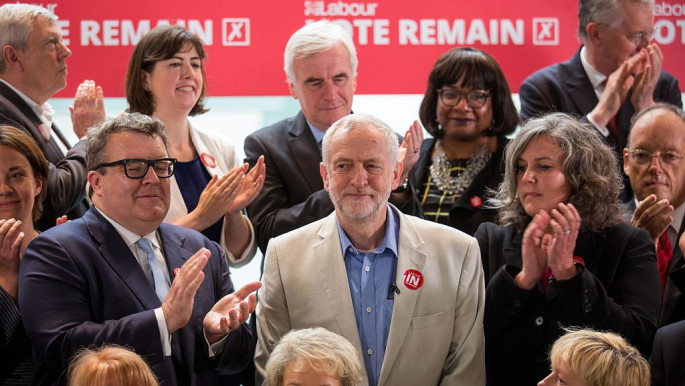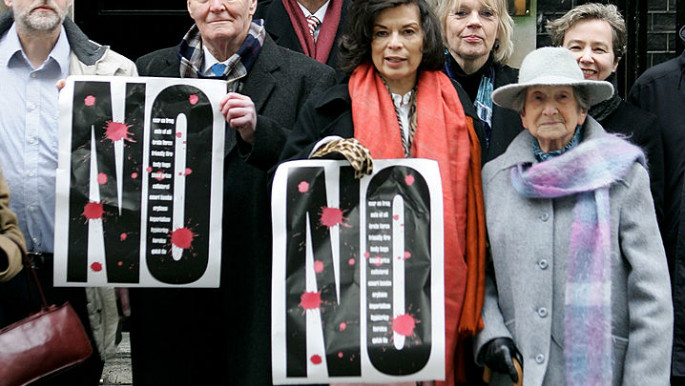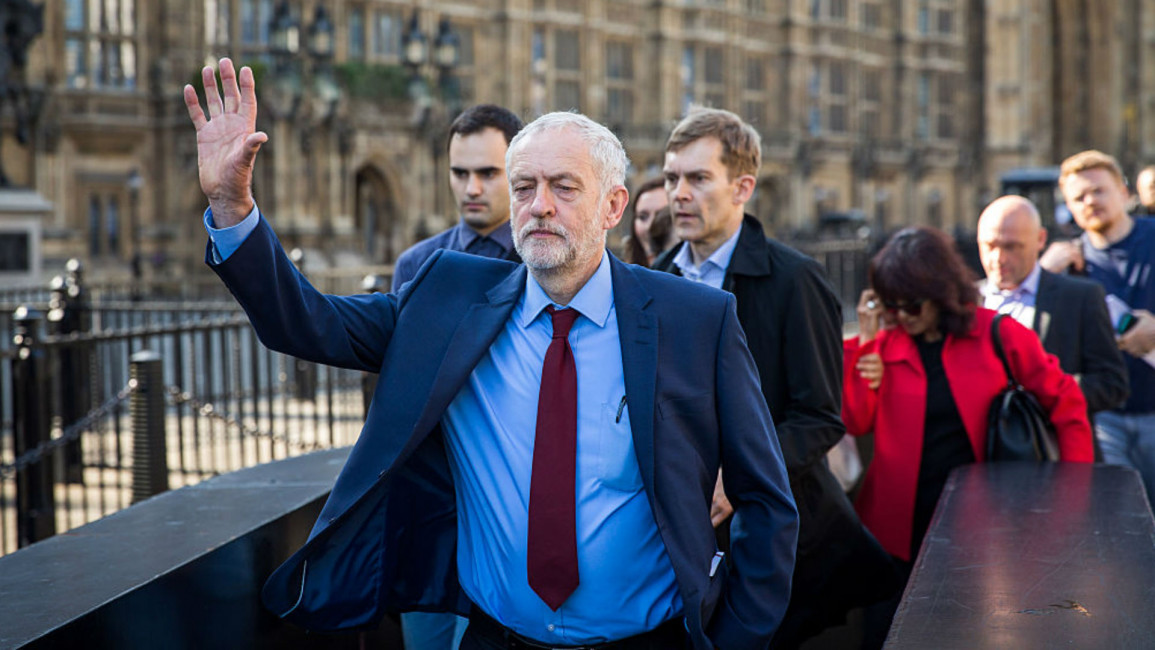Brexit: Pro-Palestine opposition leader faces crisis as mutineers arise
Veteran anti-war campaigner Jeremy Corbyn faces the biggest test of his leadership of the UK's centre-left Labour Party, after sacking shadow foreign secretary Hilary Benn on Sunday.
The move came amid increasing pressure on the leftwing leader after the failure of the EU referendum's 'remain' campaign to persuade British voters to stay in the union.
With fellow 'remainer' British Prime Minister David Cameron having already announced his resignation, opposition leader Corbyn has also faced calls to do the same for his role in Labour's parallel campaign.
Purged
News of Benn's dismissal emerged in the early hours of Sunday morning, when party sources revealed that he had been removed from his post for indicating that he would lead a coup against Mr Corbyn.
Following the shock move, Labour MP Heidi Alexander then became the first Labour MP to resign from the shadow cabinet in protest.
Asked whether more members of the Labour Party will resign, Benn told the BBC in an interview on Sunday morning that "each individual will make their own decision," adding that "he [Corbyn] is a good and decent man, but he is not a leader and that is the problem".
| Sacked: Former shadow foreign secretary Hilary Benn [Getty] |
MP Stephen Kinnock also appeared on television to call for Corbyn's resignation.
This implosion from within the centre-left party just comes days after Cairo-born MP Margeret Hodge tabled a motion of no confidence against her leader that was seconded by backbencher Anne Coffey.
Before this could be discussed next week, however, the sacking of the son of the late Tony Benn has seen many within the party draw their swords.
Grassroots support
Despite the current mood within a large section of the parliamentary to be rid of Corbyn, the leader still enjoys strong grassroots support from Labour Party members - many of whom lean more to the left than their elected parliamentarians.
A petition to keep the embattled leader in power has already received over 176,000 signatures - signalling that the North London MP could once again sweep a leadership contest if challenged.
Because of this strong support, Corbyn's allies have remained confident that he will stay in his position.
"Jeremy's not going anywhere," shadow chancellor and Corbyn ally John McDonnell told the BBC's Sunday Politics. "He was elected nine months ago, the biggest mandate of any political leader in our country, and he is not going anywhere.
"The people who are sovereign in our party are the members. It's the members who elected Jeremy and he will remain."
"If Jeremy has to stand for another leadership election, I will chair his campaign and I think the Labour Party members will elect him again," he continued.
A lack of alternatives
Initially, opponents of Corbyn's leadership may have been emboldened by the possibility that the current leader would have to secure the support of 50 MPs in order to re-stand for election. Considering this as highly unlikely, the dissenters may have been disappointed by an announcement later made by Corbyn's team that legal advice had confirmed that the leader would be automatically put up for re-election.
Adding to the woes of the leftwinger's opponents is the fact that an alternative leader has yet to emerge from their camp.
Mr Benn ruled out standing as leader in his interview on Sunday morning, and as of yet noone else has stood forward as an alternative leader.
The motion of no confidence against Mr Corbyn is expected to be considered at the Labour MPs' next meeting on Monday, which could be followed by a secret ballot the next day.
Allies of Corbyn, however, have downplayed its significance and the prospect of a no confidence vote.
Dianne Abbot, a London MP also to the left of the party, said in response that many of Corbyn's critics are "labouring under the illusion that Jeremy serves at their will and pleasure".
 |
| Divided: The Labour party has been sllit over the leadership of Jeremy Corbyn since his election last summer [Getty] |
Miscalculation?
The timing of the rise against Corbyn is seen by many as a miscalculation of Britain's current political climate.
With PM Cameron having stepped down coupled with the reluctance of his possible successors in enacting the consequences of Thursday's vote to exit the EU, many believed that Sunday morning's politics would be dominated by talk of the Conservative Party's seemingly successful coup by Boris Johnson.
 |
|
| Comrades: Jeremy Corbyn [far left] and Tony Benn [centre-left] holding anti-war placards outside 10 Downing Street [Getty] |
"We should be thinking about the nation first," Labour's shadow defence secretary Emily Thornberry told the BBC's Sunday Politics.
"Now, of all times, people think it is a good time to go for a leadership contest? I think it is extraordinary," she said.
Falling far from the tree
An irony of the struggle between Labour's leader and Mr Benn is the fact that Mr Corbyn is one of the last senior politicians in the UK to represent the politics of the former shadow defence secretary's late father.
Tony Benn - a staunch opponent of the Iraq War and an outspoken friend of the Palestinian cause - was a party backbencher in Tony Blair's government along with Corbyn.
The late leftwinger's son, however, has taken numerous stances that diverge from the politics of his late father, including having staunchly backed UK military action in Syria in 2015.
Despite being sacked today, Benn remains a prominent figure within the Labour Party and could still bolster opposition to Corbyn's leadership.


